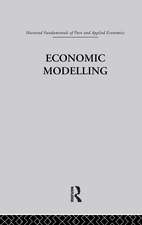Financial Regulation in the European Union After the Crisis: A Minskian Approach: Routledge Critical Studies in Finance and Stability
Autor Domenica Tropeanoen Limba Engleză Paperback – 12 dec 2019
Following Minsky’s approach, this volume explores the interplay between monetary policy, regulation and institutions in the aftermath of the great financial crisis. Minsky’s insights are used to interpret the recent regulatory changes and consider how they have affected the evolution of banks and financial markets. The unfortunate conclusion is that the changes in financial regulation introduced in various jurisdictions and inspired by the work of the Basel Committee, have not succeeded in thwarting the instability of the economic system. Instead, the mix of policies implemented so far has brought about increased fragility in the financial system. Minksy’s work on financial stability offers alternative solutions which policy-makers need to consider to resolve these issues.
Financial Regulation in the European Union After the Crisis is an important volume for those who study political economy, banking and monetary economics.
| Toate formatele și edițiile | Preț | Express |
|---|---|---|
| Paperback (1) | 381.98 lei 43-57 zile | |
| Taylor & Francis – 12 dec 2019 | 381.98 lei 43-57 zile | |
| Hardback (1) | 764.20 lei 43-57 zile | |
| Taylor & Francis – 18 ian 2018 | 764.20 lei 43-57 zile |
Din seria Routledge Critical Studies in Finance and Stability
-
 Preț: 288.26 lei
Preț: 288.26 lei -
 Preț: 292.83 lei
Preț: 292.83 lei - 28%
 Preț: 852.88 lei
Preț: 852.88 lei -
 Preț: 489.26 lei
Preț: 489.26 lei -
 Preț: 349.38 lei
Preț: 349.38 lei -
 Preț: 349.53 lei
Preț: 349.53 lei - 17%
 Preț: 172.64 lei
Preț: 172.64 lei - 12%
 Preț: 312.43 lei
Preț: 312.43 lei - 16%
 Preț: 299.52 lei
Preț: 299.52 lei - 17%
 Preț: 172.64 lei
Preț: 172.64 lei - 18%
 Preț: 1001.84 lei
Preț: 1001.84 lei - 19%
 Preț: 269.76 lei
Preț: 269.76 lei -
 Preț: 413.33 lei
Preț: 413.33 lei - 20%
 Preț: 264.13 lei
Preț: 264.13 lei -
 Preț: 382.32 lei
Preț: 382.32 lei - 18%
 Preț: 274.06 lei
Preț: 274.06 lei - 22%
 Preț: 324.29 lei
Preț: 324.29 lei -
 Preț: 389.38 lei
Preț: 389.38 lei - 15%
 Preț: 322.60 lei
Preț: 322.60 lei - 14%
 Preț: 325.70 lei
Preț: 325.70 lei - 16%
 Preț: 225.30 lei
Preț: 225.30 lei - 18%
 Preț: 1005.39 lei
Preț: 1005.39 lei - 18%
 Preț: 1003.30 lei
Preț: 1003.30 lei
Preț: 381.98 lei
Nou
Puncte Express: 573
Preț estimativ în valută:
73.10€ • 76.04$ • 60.35£
73.10€ • 76.04$ • 60.35£
Carte tipărită la comandă
Livrare economică 14-28 aprilie
Preluare comenzi: 021 569.72.76
Specificații
ISBN-13: 9780367878306
ISBN-10: 0367878305
Pagini: 186
Dimensiuni: 156 x 234 x 10 mm
Greutate: 0.27 kg
Ediția:1
Editura: Taylor & Francis
Colecția Routledge
Seria Routledge Critical Studies in Finance and Stability
Locul publicării:Oxford, United Kingdom
ISBN-10: 0367878305
Pagini: 186
Dimensiuni: 156 x 234 x 10 mm
Greutate: 0.27 kg
Ediția:1
Editura: Taylor & Francis
Colecția Routledge
Seria Routledge Critical Studies in Finance and Stability
Locul publicării:Oxford, United Kingdom
Public țintă
Postgraduate and UndergraduateCuprins
Part 1
Chapter 1
Minsky’s institutional analysis of the development of the economy and how financial regulation fits in it.
System’s endogeneous dynamics versus institutions and interventions.
Financial innovation as bricolage.
Minsky on money manager capitalism, finance and thwarting systems.
Chapter 2
Recent proposals of change in financial regulation inspired by Minsky.
Is the central bank the only circuit breaker left ?
Conclusions
Chapter 3
Basel III: the revised capital requirements, the leverage ratio, and total loss absorbing capacity.
Introduction
The revised capital requirements. Just a change in the weights?
How the revision in capital requirements should work in practice.
Other macroprudential measures.
The Leverage Ratio
The definition of leverage ratio and how to calculate it.
Too much hope in this new tool?
Total loss absorbing capacity in the EU.
Conclusions
Chapter 4
Two additional regulatory metrics: the Liquidity Coverage Ratio and the Net Stable Funding Ratio.
The Liquidity Coverage Ratio.
How to calculate the numerator of the ratio.
How to calculate the denominator of the ratio.
Conclusions about the theoretical underpinnings of the ratio.
Eba’s studies on the application of the BCBS designed liquidity coverage ratio to the European Union banking system.
The Net Stable Funding Ratio.
How to calculate the net stable funding ratio.
The treatment of derivatives in the NSFR and the discussion with industry representatives.
What type of banking does the NSFR favor?
Conclusions
Chapter 5
Main consequences of the interaction between new regulatory rules (risk weighted capital requirements, lev
Chapter 1
Minsky’s institutional analysis of the development of the economy and how financial regulation fits in it.
System’s endogeneous dynamics versus institutions and interventions.
Financial innovation as bricolage.
Minsky on money manager capitalism, finance and thwarting systems.
Chapter 2
Recent proposals of change in financial regulation inspired by Minsky.
Is the central bank the only circuit breaker left ?
Conclusions
Chapter 3
Basel III: the revised capital requirements, the leverage ratio, and total loss absorbing capacity.
Introduction
The revised capital requirements. Just a change in the weights?
How the revision in capital requirements should work in practice.
Other macroprudential measures.
The Leverage Ratio
The definition of leverage ratio and how to calculate it.
Too much hope in this new tool?
Total loss absorbing capacity in the EU.
Conclusions
Chapter 4
Two additional regulatory metrics: the Liquidity Coverage Ratio and the Net Stable Funding Ratio.
The Liquidity Coverage Ratio.
How to calculate the numerator of the ratio.
How to calculate the denominator of the ratio.
Conclusions about the theoretical underpinnings of the ratio.
Eba’s studies on the application of the BCBS designed liquidity coverage ratio to the European Union banking system.
The Net Stable Funding Ratio.
How to calculate the net stable funding ratio.
The treatment of derivatives in the NSFR and the discussion with industry representatives.
What type of banking does the NSFR favor?
Conclusions
Chapter 5
Main consequences of the interaction between new regulatory rules (risk weighted capital requirements, lev
Notă biografică
Domenica Tropeano is Associate Professor at the Department of Economics, Università di Macerata, Italy.
Descriere
Following Minsky’s approach, this volume explores the interplay between monetary policy, regulation and institutions in the aftermath of the great financial crisis. Minsky’s insights are used to interpret the recent regulatory changes and consider how they have affected the evolution of banks and financial markets. The unfortunate conclusion is




